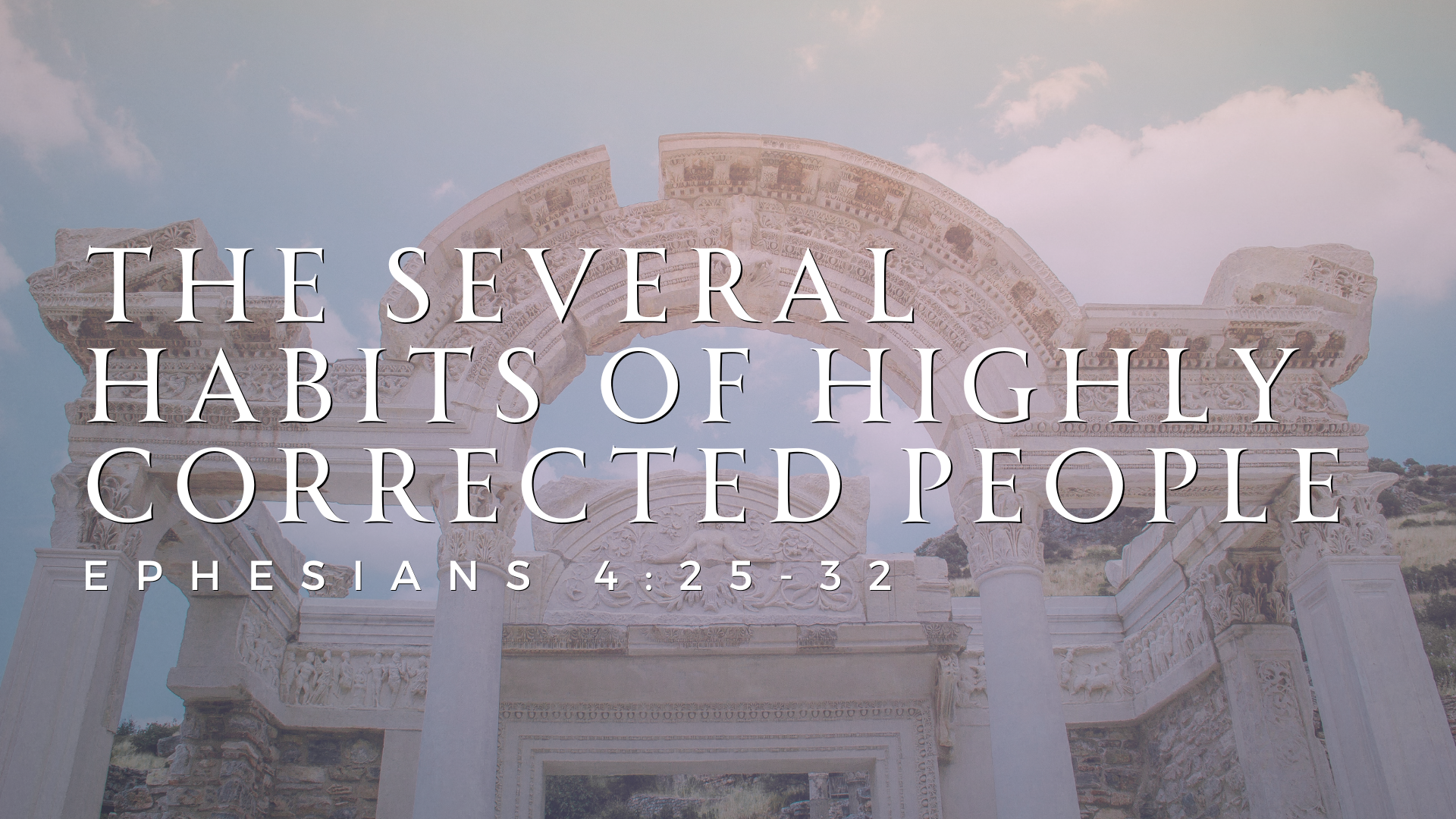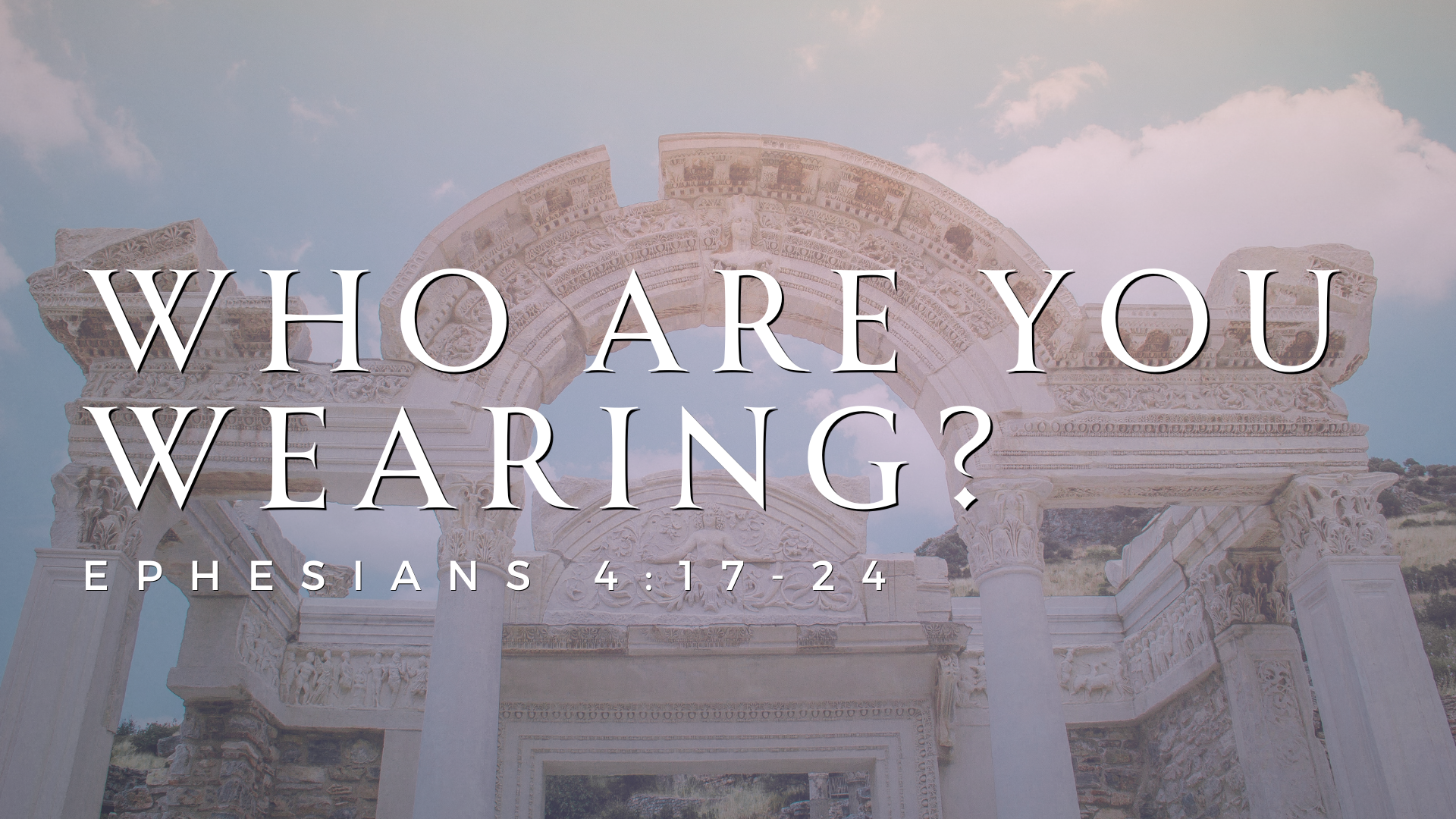
The Several Habits Of Highly Corrected People (Ephesians 4:25-32)
Ephesians 4:25-32 – 25 Therefore, putting away lying, speak the truth, each one to his neighbor,, because we are members of one another. 26 Be angry and do not sin. Don’t let the sun go down on your anger, 27 and don’t give the devil an opportunity. 28 Let the thief no longer steal. Instead, he is to do honest work with his own hands, so that he has something to share with anyone in need. 29 No foul language should come from your mouth, but only what is good for building up someone in need, so that it gives grace to those who hear. 30 And don’t grieve God’s Holy Spirit. You were sealed by him for the day of redemption. 31 Let all bitterness, anger and wrath, shouting and slander be removed from you, along with all malice. 32 And be kind and compassionate to one another, forgiving one another, just as God also forgave you in Christ.
Clothes make the man. Mark Twain is often cited as the source of that famous phrase, but versions of it are found in the works of Shakespeare, Erasmus, and Homer.
We also find the sentiment in the second half of Ephesians, where Paul tells us to strip off the old man and instead put on Christ. Take off the old self, no longer walk as the Gentiles do, put on the new self and walk worthy of your calling. That’s what Paul commanded, but how does that work out in real-life terms? That’s what our text tonight provides. Paul starts to give us the practicalities of Christianity. By the end of the letter he will have covered many aspects of life.
Some of the things he talks about are very elementary. These early Christians were, in some cases, “learning the most basic ethical lessons.” We may think we’ve come a long way from needing to be told that we shouldn’t lie or steal but on the other hand, take a look around. We live in a culture that is coming apart at the seams. The foundations of ethics and morality are crumbling. Those who don’t know the Lord do need the basic lessons of Biblical ethics. And, those of us who have been instructed in these things can always benefit from a reminder of the fundamentals.
Because, left as we are, in our fallen human nature, we will deteriorate into lying, thieving, shouting monsters who cause pain to those around us. But, thanks to the grace of God, we are empowered to take off that old nature and put on Christ, and with Him a powerful newness that generates an overflow of grace in our relationships with other people and with the Lord Himself.
Ephesians 4:25 – 25 Therefore, putting away lying, speak the truth, each one to his neighbor, because we are members of one another.
This is the third of four “therefores” between chapter 4, verse 1 and chapter 5, verse 1. Therefore, walk worthy. Therefore, no longer walk as gentiles. Therefore put away certain behaviors and instead put on other behaviors. Therefore, imitate God.
The therefores flow out of the mysteries and truths that were revealed in the first three chapters. All that God has done. All that God has provided. All that He has called us to. All that He has chosen and predestined us for. All that He has accomplished and is accomplishing in our lives. Therefore we can put on the equipment, operate in the power, and experience the transformation of salvation. This is how we exercise our faith. This is how we put the power of God into practice.
Paul begins with “put away lying.” Another way of reading it would be “strip off falsehood.” He’s still using clothing words.
Why do we lie? Why is it one of the first things we do as children? We lie because we either want something for ourselves or we don’t want someone to know the truth about us. We lie to manipulate or to excuse or to try to cover guilt. It’s a selfish action.
One of the big themes of Ephesians is that your life is not just about you. Your life is meant to be joined into the massive, ongoing work of God. Your life has been designed and handcrafted so that you can be connected to other people. You are now a neighbor. Notice what Paul said. “Speak the truth, each one to his neighbor.” Well, who is my neighbor? That was a question someone asked Jesus and He gave us one of the greatest parables ever.
If you’re a Christian, God wants you to see yourself as a neighbor to the people around you. And, when it comes to other Christians, you’re more than a neighbor, you are members of one another. Living stones, conjoined and (hopefully) harmonizing together as you walk with the Lord.
This proves to be a challenge in our individualistic culture. America has always loved individuality, but now, coming out of the pandemic, individualism has a new malignancy. Many people see others as enemies, others as infectors, others as the source of all the problems in the world. Paul will remind us that our struggle isn’t against flesh and blood, but against spiritual forces of evil.
The Christian life is about community. Yes, you have an individual faith and you are an individual part in God’s work, but we are always connected to others and we always have a responsibility to others – to build them up and unify together and grow as we each walk with the Lord.
So, we are to put off lying and live by the truth. We don’t just give the Lord lip service. Instead, we live with our lips in service of His truth. Because words matter. Our speech matters.
Ephesians 4:26-27 – 26 Be angry and do not sin., Don’t let the sun go down on your anger, 27 and don’t give the devil an opportunity.
These verses are often yanked out of the passage and, generally, the idea is “Anger is not a good thing, but we all get angry, so if you get angry don’t sin and make sure you deal with it by bedtime.”
But, does that make sense in the context? If I took out anger and put in a different sin, would we feel comfortable with that interpretation? In the context of the passage, what do we see? Paul – multiple times – presents a do/don’t formula: Don’t lie, speak the truth. Don’t steal, work honestly. Don’t rage, be compassionate. But here, “Well, you’re gonna be angry…I guess just don’t do it too much.” It doesn’t fit with how Paul has been talking. Strip off lying. Put away the old man. No longer walk as the Gentiles do. “Eh…you’re gonna be mad sometimes…just keep it to a dull roar.”
There are a couple of great papers that demonstrate that Paul is not saying “If you get angry,” or, “When you’re tempted to anger,” but that this is a command: BE angry!
A lot of commentaries will admit that Paul seems to be talking about “righteous anger,” but then they quickly say, “Yeah, but even righteous anger is going to lead to sin, so don’t do it.” Some point to verse 31 where we read “Let all…anger…be removed from you” and say, “There you go.” Well, which is it? Is it “remove anger right now,” or is it, “anger is a part of life, so give it the rest of the day, but if you stay angry while you sleep, the Devil is gonna get you good!”?
Paul is differentiating anger and sin in verse 26. It seems he’s giving us a command. The Ephesian church may have been struggling with lying, with theft, and with relational conflict. We know from Acts 20 that men from within their own group were going to rise up and become what Paul called “savage wolves,” seeking to distort the truth. And so, there’s a good case to understand verse 26 as Paul saying, “be angry about the fact of such sin in your midst and do something about it! Don’t wait, but act now! Because if you don’t Satan will establish a beachhead in your congregation.
Think about it this way: The Ephesians were just told to put on Christ, right? In chapter 5, verse 1, they’ll be told to be imitators of God. Does God get angry? Is it a sin when He gets angry? When did Jesus get angry? He was angry at the moneychangers who were defiling His Father’s house and putting barriers between God and man. He was angry at the Pharisees when they tried to stop Jesus from healing a man on the Sabbath. He was angry when the communion of God and man and believers together was obstructed or taken advantage of. God’s anger is against sin.
Now, anger is not God’s leading attribute. He is slow to anger. Isaiah 28 tells us it is His unexpected and unusual work. But righteous anger is a part of Who He is, and therefore, if we are putting on Christ, there should be an element of righteous anger against sins that divide. That’s what we need to act quickly on because, when we don’t, the Devil is able to get a foothold in the church.
Paul’s letters are full of exhortations to act quickly in response to some open sin among the church body. With that said, in these angry times, it is important that we differentiate man’s anger and God’s anger. Man’s anger is something we need to put off. Stephen Fowl writes, “Anger cannot and should not be the Christian’s constant disposition.” So, let’s not indulge ourselves in human anger and pretend like it’s all righteous indignation. God’s anger is not just about feeling mad.
There’s one more hint that this is what Paul meant when he said be angry. In Jesus’ letter to this church in Revelation 2 we read: “I know that you cannot tolerate evil people. You have tested those who call themselves apostles and are not, and you have found them to be liars.” So it seems they were faithful to do something about the lying wolves Paul warned them about. They were provoked to do what was necessary to protect the life and health of the Body, and that was a good thing.
Ephesians 4:28 – 28 Let the thief no longer steal. Instead, he is to do honest work with his own hands, so that he has something to share with anyone in need.
It seems this was a current problem. He didn’t say, “Some of you used to be thieves, now you don’t steal anymore.” He said, “Stop stealing.”
Of course, stealing isn’t just pocketing something that doesn’t belong to you. It includes uneven scales. Leeching off others when you’re able to provide for yourself. Not being honest on your taxes. We should take this verse to heart as we watch our society become more and more rife with theft. We need these basic reminders of right and wrong.
Why do people steal? It’s like lying. It’s for self. I want something, so I take it. But the Christian life is oriented around others – loving neighbor as yourself. So not only should we not steal, we should swing all the way to the other end, where we work to store up a surplus so we can give to others.
Notice though: Paul encourages us to share with those in need, not in want. What’s the difference? Just because someone wants something, doesn’t mean they need it. But who decides? The Spirit does. When we decide, we tend to make arbitrary, restrictive lists. But, in the Bible, we see God signing off and all sorts of things. Sometimes a cup of water is what is “needed.” Sometimes it’s medical care. Sometimes it’s a warm welcome. Sometimes it’s clothing. Sometimes it’s borrowing a donkey for an afternoon. “The Lord has need of it.”
Sometimes it’s a box of presents for a child on the other side of the world. Or giving someone a ride when they’re walking home in 115° heat. The Spirit knows and will guide. Our part is to prepare to share. It takes a willing mentality and, in some cases, a stored up supply of resources.
Ephesians 4:29 – 29 No foul language should come from your mouth, but only what is good for building up someone in need, so that it gives grace to those who hear.
Just like our earnings can help those in need, so too our words can help those in need. How? because our words can be a conduit of God’s grace and truth. Truth sets people free and grace builds them up. It gives them strength for living.
Since our words can be such a help for those in need, like a spring in a desert, of course we don’t want anything foul to come out of it. Foul literally means “rancid fish, rotten wood, withered flowers, or diseased lungs.” To speak ungraciously is like poison – like stealing from a neighbor.
Ephesians 4:30 – 30 And don’t grieve God’s Holy Spirit. You were sealed by him for the day of redemption.
Paul breaks in with this reminder that life is not just about our conduct toward others, it’s also about our closeness with God. Specifically, Paul talks to us about our relationship with the Holy Spirit. He is our Helper, our Comforter, the One Who will guide us in all truth. If you’re a Christian, He permanently indwells your heart. He is here with us, right here, right now.
Did you know you can hurt him? Not in the sense that you could weaken Him in any way, but “root idea of the word ‘grieve’ is ‘to cause pain.’” It’s possible because He’s a real Person you are in relationship with. He cares about your life and your words and your activities.
God has so much love for you, so many intentions and thoughts toward you, He has done so much on your behalf. When we rebel against Him, when we yank away from His tender touch, when we stamp our feet and dive into the filth of sin, of course it brings Him sorrow. God is a Person. He is a God Who weeps. He is a God of emotion – perfect emotion, but still He feels. He cares.
You see, it’s not just that God has done a lot for us. It’s not that God has provided a bunch of awesome equipment and now we can choose to wear it or not. It’s also that God is with us now and He is whispering to our hearts even now. He has taken up residence with in us. He walks with us. He calls to us. He works in and through us. He attaches Himself to us. He is bringing us to this final day of redemption where all will be made right and we can either bring the Lord joy or grief. When we forget what God’s plan is, when we forget what He has made possible in our lives by the power of His grace, we will fall back into the old nature and bring Him grief.
Ephesians 4:31 – 31 Let all bitterness, anger and wrath, shouting and slander be removed from you, along with all malice.
These are all things we’re to take off. These are the old garments of the sin nature. The word “removed” can also mean “weigh anchor.” We’re to sail our lives away from these things because they are incompatible with Christianity.
But, again, these characteristics define our culture right now. Every cable news show. Every viral video. Every political email. These are the vices being sold to us as virtues.
All of these attitudes are rooted in unforgiveness. Which is why instead of being clothed in resentment and hatred, we should:
Ephesians 4:32 – 32 And be kind and compassionate to one another, forgiving one another, just as God also forgave you in Christ.
Who did Christ forgive? He forgave the thief dying beside Him who had spent some of his last breaths blaspheming the Savior of the world. He forgave Peter, His dear friend who denied Him three times. He forgave the rest of the disciples who abandoned their Lord when trouble came. He forgave the very people who pounded the nails into His hands and feet. “Father, forgive them, they know not what they do.” He forgave Saul of Tarsus, killer of Christians. He forgave you and me. He forgives anyone who will surrender to Him and receive His gift of grace. Anyone.
That’s how big His mercy is. That level of compassion, that breadth of forgiveness is ours to put on. That’s the robe Christ gives us – the clothes of the Kingdom. And we must put on this forgiveness, not only for the benefit of others and the furtherance of the Gospel, but because our forgiveness of others is tied to God’s forgiveness of us. We read about it in the Sermon on the Mount and in the parable of the unforgiving servant. Serious passages worth our study.
People remember Mark Twain saying that “clothes make the man.” Actually, that’s a paraphrase. Here’s the full quote: “[One] realizes that without his clothes a man would be nothing at all; that the clothes do not merely make the man, the clothes are the man; that without them he is a cipher, a vacancy, a nobody, a nothing…There is no power without clothes.”
The garments of Christ, the new self He has provided and invites us to put on, transform us into the people God has created us to be. There is no power without these clothes. Without them, our lives wither. With them we become part of something eternal, supernatural, magnificent. Put on Christ.








